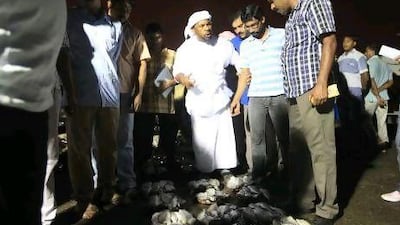ABU DHABI // The sorting begins at 3am. A dozen dhows are docked at Abu Dhabi's Mina Zayed, beside an empty car park that will become an auction hall.
Fishermen, bleary-eyed from little sleep and long days on a hot sea, wake to sort fish into lots for the pre-dawn auction.
At this hour, the only sounds at the fish market are the lapping of water, the slapping of fish being sorted on decks and the yowling of cats "on patrol". They hiss when strangers go near their fish, and rub the legs of their "owners" with raspy purrs.
"This is my cat, Moosa," says Firas, a salesman. The cats have reason to be protective: fish are scarce during the summer season.
"Fish have a brain just like you. The computer's inside," says Sultan Mohammed Al Zaabi, 63, a fisherman for 50 years and a former pearling apprentice. "They're always in the Gulf but they go to the depths, always, always."
Even so, a midsummer's rain means that it is a good day at the market. Dhows arrived at 11pm the night before, laden with trevali, mackerel, sweetlips, rabbit fish, sheri, hammour and crab – a fair catch for the summer months.
The auction begins at 4.30am. Two Emirati auctioneers, kandouras tied at their waists, lead a group of quiet buyers around the small piles of fish laid out in lots in the car park.
Governing one of the markets is the elder, Saeed Rashid, an auctioneer in his late 60s with 22 years of experience. He uses a cane to help him carry his 1.54-metre frame.
At the other end, there's the young Ahmed Nubi. He carries himself like a boxer, punching the air as he barks numbers.
"There's no competition between us," Mr Rashid says after the auction. "I taught him, like the millionaire Mohammed Khalfan [a former auctioneer] once taught me. People don't like to be shouted at."
"Why do I shout?" Mr Nubi asks. "He's shaiba [an old man] and I'm a shabab [young man]. The people near Saeed Rashid will hear Ahmed Nubi and they will come to Ahmed Nubi. All of his men hear me and come to me. He didn't teach me, no. I have always lived in the sea. I know fish." He says it like a threat. There is fire in his eyes.
"Ahmed Nubi cancelled his work but came back here," says Mohammed Al Zaabi, 62, a retired fisherman who watches the auction over tea. "He just likes to sell the fish."
Hovering between the auctioneers is Nadia Ismail, the lady of the fish market. Umm Ahmed, as she is known, arrives each morning at 3.30, swaddled in rings and perfume, a Burberry bag on her arm as if she is the queen, and three-inch platform shoes that keep her henna'd toes above the fish.
She says things like: "I work for the Princess Trading, that is important." And: "I spray myself with Dior. It's essential."
She is known for having a keen eye but never touches the goods.
"Red gills and eyes that pop. I know fish," she says, as if it's a fundamental part of a woman's grace.
She coos the word "hammour" as one flaps at her hem. "Oh my God. Oh. My. God," she says, her eyes narrowing beneath plucked brows. "Yes. Fresh."
Umm Ahmed, a mother of five, was a healthcare administrator before joining the trade she learnt from her brother as a young woman in Egypt. She is the only woman at the market – "one, alone", she says – but none give her a second look. She calls to "her brothers" by name.
"When you work here every day, it's no problem for a woman," she adds. Umm Ahmed works 16 hours a day and passes 12 of these hours at market stall number 30.
"Sometimes my feet get a little sore," she concedes. "But fish business is very nice business."

